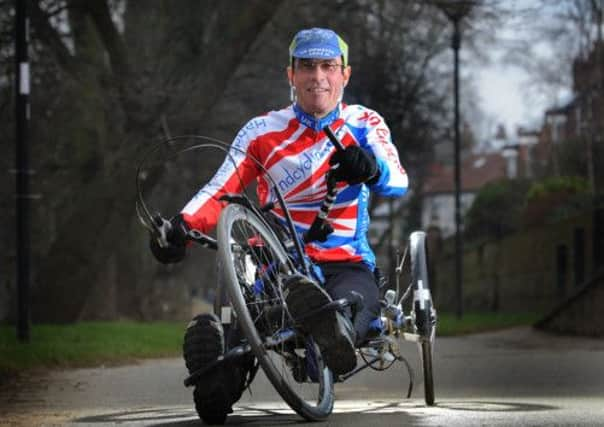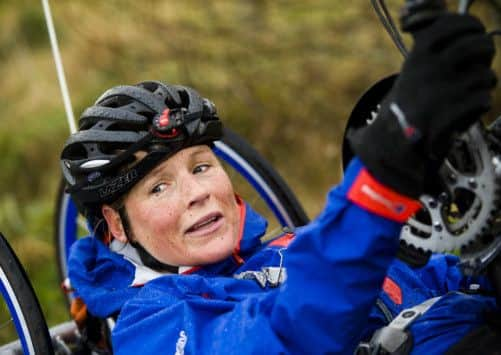Strong arm tactics drive sport forward


Arm power has taken Karen Darke to some incredible places.
Since propelling her way to a silver medal on her handbike at the Paralympics Games in London 2012, the Halifax-born adventurer is now preparing to sit-ski a thousand kilometres to the South Pole.
The trip to Antarctica is just the latest in an amazing list of challenges she has set herself since becoming paralysed at the age of 21. They include climbing Mont Blanc, kayaking through Alaska and hand-cycling across the length of Japan.


Advertisement
Hide AdAdvertisement
Hide AdHer list of adrenaline-fuelled conquests would be amazing feats for anyone, but are even more remarkable for someone confined to using her upper body strength alone. And now Karen’s story is inspiring a new generation of handcyclists up and down the country.
Hand biking in Britain has really taken off in the last 10 years. The Handcycling UK Association reports a big rise in the number of people signing up for taster days up and down the country and the association is now hoping to organise a handcycling event alongside the Tour de France when it comes to Yorkshire next year. Karen says she would love to be involved in it.
“It would be a huge honour. I used to go and watch the Tour de France as a kid – my dad is an avid cyclist. It’s coming through my home towns of Hebden Bridge and Mytholmroyd – so to be there alongside it in Yorkshire would be amazing.”
Karen, 41, first started handcycling four years after an accident left her paralysed from the chest down. A keen runner, climber and outdoor addict, she was on a rock-climbing expedition in Scotland in 1993 when she fell off a sea-cliff.
Advertisement
Hide AdAdvertisement
Hide AdThe night before the accident she remembers telling friends that she would rather die than be paralysed, but lying in a hospital bed, she knew the one thing the fall hadn’t damaged was her spirit of adventure. Shortly afterwards she took up sailing and then in 1995 she discovered handcycling.
“I had my first handbike made by a frame builder in Scotland, not long after I was paralysed. I just knew I wanted to cycle and came across the concept of a handbike. I also had a tandem made – you pedal it with your arms at the front, legs at the back, and that took me on some great adventures like over the Himalayas in 1996.”
Along with three friends, she organised a 1,500 mile journey through the mountains of Central Asia, from Kazakhstan to Pakistan. Her thirst for adventure has since taken her sea kayaking across a 1,200 mile stretch of the Canada – Alaska coastline and rock climbing up the overhanging precipice of El Capitan, a giant granite rock face in Yosemite National Park. Her most adventurous trek to date has been a 600km journey across the Greenland ice cap, where the winds can reach 200 miles per hour and temperatures can drop below 40 degrees.
The Pole of Possibility will be even tougher. She plans to sit-ski a thousand kilometres from the edge of Antarctica to the South Pole across one of the most inhospitable environments on earth – a frozen wasteland littered with crevasse fields and ice boulders. Along the way, she hopes to raise £1m for the Back-Up Trust, a charity working to transform the lives of people who have suffered spinal cord injury. But she needs sponsors.
Advertisement
Hide AdAdvertisement
Hide Ad“Our plan is to leave in November 2013 but unless we find a corporate sponsor, we will have to postpone it. We had our first training trip to Norway in January and it went well. I train everyday anyway for the cycling team, so physically I’m not too worried about my fitness. It’s more the mental and endurance side of it, and the environment that will be tough.”
Karen, who lives in the Highlands, has to be particularly careful in freezing conditions because the paralysis means she can’t regulate her body temperature.
Following the South Pole expedition, she plans to get back on her handbike and train for the next Paralympics.
“I’m on the British Cycling Paralympics squad. I hope I’m good enough in 2016 to get selected for Rio, but nothing’s a given. The standard in most Paralympics sport is extremely high and you can’t just assume you’ll make it.”
Advertisement
Hide AdAdvertisement
Hide AdWhen she first started handcycling, few people had heard of it.
“It certainly wasn’t a big sport, no races, no real awareness of it. It’s really taken off in the last 10 years and is still growing year on year, along with the design of handbikes which is improving all the time, becoming more aerodynamic.”
Does she believe she has inspired the next generation of handcyclists?
“I have no idea, but I know that it is a sport that has given me so much enjoyment, freedom and fun, and has probably kept me sane through the almost 20 years that I’ve been paralysed. Racing is relatively new for me – I only started racing seriously two years before London 2012, so it was a bit of a dream to get to the London Paralympics. I think when a sport makes it into the Paralympics and gains more profile then it naturally inspires others. I was inspired to take up racing when I saw that handcycling was in the Paralympics for the first time in Beijing.”
Advertisement
Hide AdAdvertisement
Hide AdHandbikes are pedalled and steered using the arms, most are tricycles with two coasting rear wheels.
“It’s slower going uphill than a regular bike as you can’t get out of the saddle and power it with your body weight – but you get used to that,” says Karen. “I much prefer it to a racing wheelchair as you’re not scrunched up with your head thrown down towards the tarmac. You get more speed. It’s a more balanced action on the muscles of the body. You push and pull or pedal in a circle so you use all the upper muscles and you get a better view.”
Keen handbiker Andy Chamings, who is the vice chair of Handcycling UK, is one of the organisers hoping to set up the handcycling event in Yorkshire alongside the Tour de France next year.
He says: “It’s early days yet but we are hoping to have an event that ties in with the Tour de France. It could be a racing event, possibly even a European one because there is a European handcycling circuit.”
Advertisement
Hide AdAdvertisement
Hide AdAndy, 55, a retired history and IT teacher, from York says he loves the freedom that comes with handcycling. He can often be seen hand pedalling up steep peaks in the Dales. “I’m particularly unusual amongst handcyclists in that I like the hills but that’s my background in mountaineering. I cycle in the mountains whenever I can whether it’s the Alps or in Britain.”
Andy was just 20 when he fell off a crag while rock climbing in Shropshire. He suffered a spinal cord injury and partial paralysis and has to use a wheelchair. Yet he says he spends more time on his handbike than in his wheelchair.
“It’s freedom. You can get out on your bike; you’re independent, using your own power. There are aspects of being stuck when you’ve got a disability, I’ve been there for decades and I’ve had a good life but there’s no question that the bike gives freedom and independence and of course it’s good for your health.”
He says it is also one of the few sports where disabled people can take part alongside the able-bodied.
Advertisement
Hide AdAdvertisement
Hide AdHandcycling UK has just launched an appeal to raise £10,000 to buy five new children’s bikes.
“The cost is certainly a barrier to participation,” says Karen. “It would be ideal if the UK system was similar to how I believe it is in Germany – where the government provide funding towards equipment that will keep you healthy, so people get handbikes bought for them – a kind of proactive health approach instead of reactive.”
Making pedal power accessible to everyone
Hand Cycling Association UK believes that all children should have the opportunity to ride a bike regardless of mobility or balance problems. This year the organisation is looking to raise £10,000 to buy five handbikes that can be used to proved training and development days for youngsters.
All money donated to the fundraising drive will go directly to the cause.
To find out more go to www.handcycling.org.uk. Karen can also be sponsored via the website or at www.poleofpossibility.com.